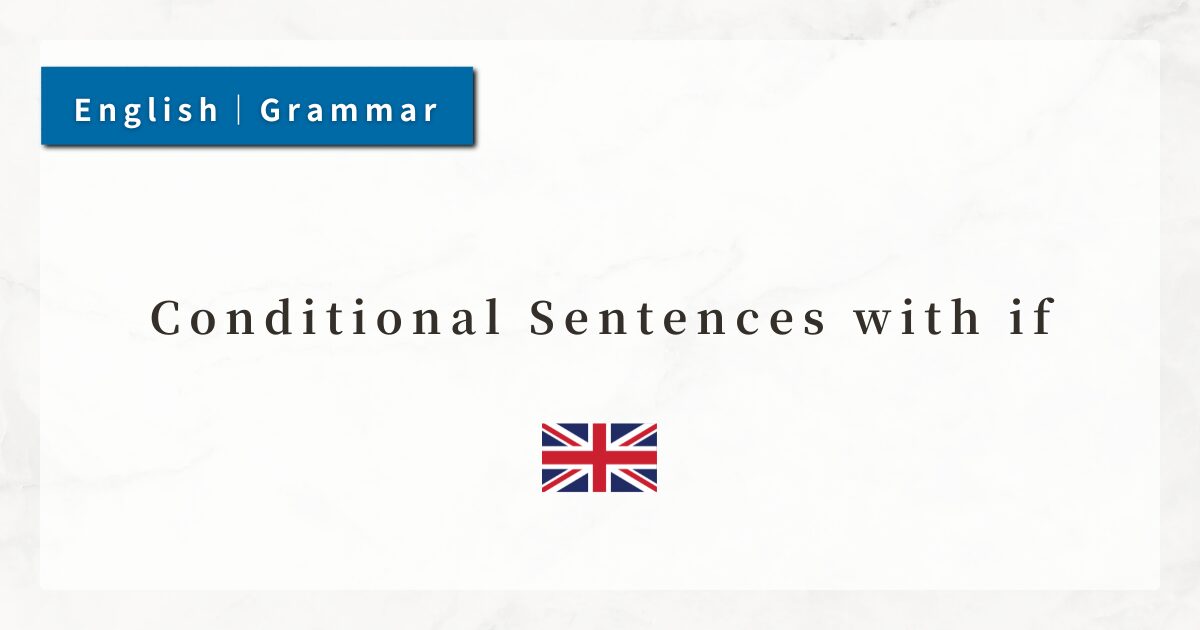#37 Conditional Sentences with if|Basic Rules and Example Sentences

In English, when I want to express conditions such as “If ~, then …”, I use conditional sentences with if.
This basic structure is widely used in contexts ranging from daily conversation to business. Depending on the situation, the expression changes—for example, when talking about the future, making hypothetical statements contrary to reality, or imagining a past that did not happen.
In this lesson, I will organize the basic rules of the if-structure and the three main types of conditional sentences, and explain how to use them in a clear way.
1. Basic Rules of Conditional Sentences with if
The word if means “if/when” and functions mainly as a conjunction linking two clauses.
- If + subject + verb, subject + verb ….
A conditional sentence has an if-clause (expressing the condition) and a main clause (expressing the result).
These two clauses are usually separated by a comma. The if-clause can appear either at the beginning or in the middle of the sentence.
- If it rains, we will stay home.
- f it is sunny, I will go out.
Conditional sentences are broadly divided into three types:
- Realistic conditions
- Hypothetical conditions (Subjunctive Past)
- Hypothetical conditions about the past (Subjunctive Past Perfect)
I will now explain each type in detail.
2. Conditional Sentences for Future Possibility (Realistic Conditions)
- If + present tense, subject + will + base verb.
This is the most basic form, used when talking about something that may realistically happen.
- If it rains tomorrow, we will cancel the picnic.
In this example, the condition is based on a realistic possibility: it might rain tomorrow.
Important Rule: Even when referring to the future, I must use the present tense in the if-clause, not will.
3. Subjunctive Past (Unreal Conditions in the Present)
- If + past tense, subject + would + base verb.
This type of conditional sentence is used to describe a hypothetical situation contrary to the present reality, often translated as “If ~, … would …”.
- If I had a lot of money, I would travel the world.
In reality, I do not have much money, so I cannot travel.
Special Rule: In the subjunctive past, the verb be is usually expressed as were for all subjects, even with the first person singular “I”.
- If I were you, I would accept the offer.
4. Subjunctive Past Perfect (Unreal Conditions in the Past)
- If + had + past participle, subject + would have + past participle.
This form is used to describe a hypothetical situation contrary to a past fact, meaning “If ~ had …, … would have …”.
- If she had studied harder, she would have passed the exam.
This implies that in reality, she did not study hard enough, so she failed the exam.
5. Summary
- if is a conjunction meaning “if/when.”
- There are three main types of conditional sentences:
1. Realistic Condition:
If + present tense, subject + will + …
2. Subjunctive Past (Unreal in the Present):
If + past tense, subject + would + …
3. Subjunctive Past Perfect (Unreal in the Past):
If + had + past participle, subject + would have + past participle - Even when referring to the future, the if-clause must use the present tense.
- In the subjunctive past, the verb be is generally expressed as were.






